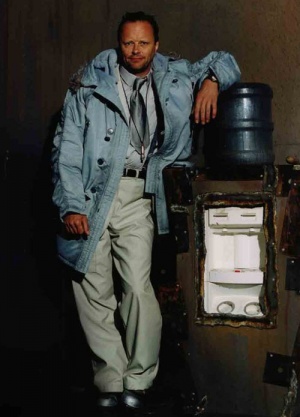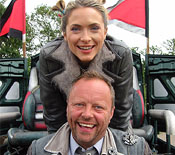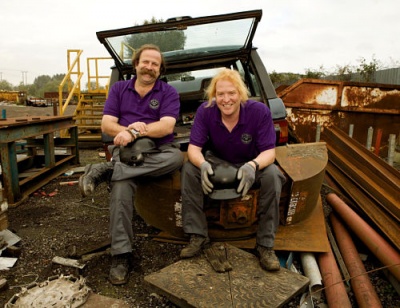Scrapheap Challenge

Contents |
Host
Sally Gray (pilot)
Robert Llewellyn (series 1-10) with Cathy Rogers (series 2-4), Lisa Rogers (series 5-10)
Dick Strawbridge (series 11)
Co-hosts
Narrator: Gareth Jones (pilot)
Broadcast
RDF Television for Channel 4, 12 April 1998 to 27 June 2010
Scrappy Races / Rally 1 February 2004 to 19 February 2006
Synopsis
Evidently a lot of people missed this gem first time round, so Channel 4 changed the title from Scrapheap to Scrapheap Challenge for series 2 as if to say "Hey, it may be Sunday afternoon but not everyone's showing repeats of 1940s black and white films. Look! See! Here's something with some laffs!"
Robert Llewellyn (who will always be best known as Kryten in Red Dwarf for the rest of eternity whether he likes it or not) gave two teams opportunities to build something rubbish from lots of rubbish - but prepare to be genuinely impressed!
The two teams were asked to build buggies, catapults, powerboats, rockets and diving bells. There were two teams that were made up of three regulars (who were in every episode) and a special guest member who would have some tenuous link with whatever was being built.
Beware - falling sun
At the top of the show, Bob would tell the teams what they were going to be building and told them that they would have "until the Sun falls out of the sky" - or ten hours to the lay person.
A big wall of rubbish (mainly crushed cars) hides both team bases from each other. The first thing the teams would do was planning what they needed with the team's expert. Once decided, the team representatives would venture out into the junkyard (the same one Channel 5 use to get their prizes, fact fans) and attempt to find the bits that they need. For this they are given a buggy to carry stuff around in and a headset so they can talk to the captains. What this amounts to is a race basically, with each team looking for the same bits of scrap. In several episodes, necessary specialist equipment had to be hidden randomly in the yard.
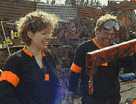 The orange team gets to work.
The orange team gets to work.The teams making their contraptions then took up most of the show. The trials and tribulations were all captured on film. And these would be intermixed by Bob talking to the resident specially-brought-in-to-commentate expert who would comment regularly throughout the show on the teams' progress and explain why teams are doing what they are doing. Anything too complicated would be explained by Robert on a televisual computerised blackboard. Niiice.
Nut wrenching imminent
The one thing that strikes the viewer whilst watching this nut-wrenching and spanner-twisting it is that what could and should be really boring actually turns out to be very entertaining. Why is this?
First, you have entertaining contestants and a fair amount of emphasis is put on the banter, camaraderie and competition between them. The sort of people who take the whole thing seriously yet don't, if you see what we're getting at. Secondly, Robert Llewelyn's darkly humorous commentary and slightly outlandish observation adds to the lilt, such as "Join us in part two to see if they drown."
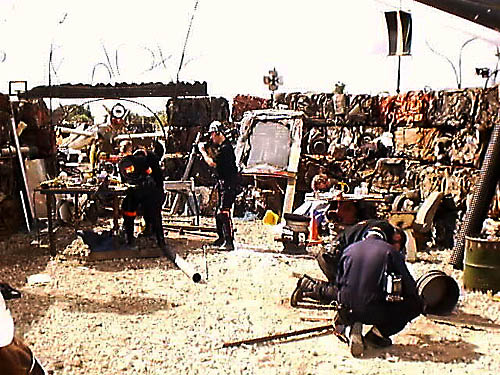 One of the team bases. The walls are made of crushed cars. Notice the blackboard (centre) on which brainstorming sessions normally take place.
One of the team bases. The walls are made of crushed cars. Notice the blackboard (centre) on which brainstorming sessions normally take place.But, eventually, the ten hours will run out and indeed the Sun will have fallen out of the sky. In the last couple of minutes there is usually the inevitable "oh-no-there's-something-wrong-it's-not-working" problem which they usually fix before the time is up. Then the team try out their machine, depending on what they'd built that week. In series 1, we had:
- Catapults: Each team has fifteen minutes in order to hit their opponent's base turret with as many cabbages as possible from fifty meters away. Whoever hits the most times wins unless they manage to hit and knock off the puppet sitting in a window in the middle of the turret, in which case that's an automatic win.
- Power Pullers: Each teams puller is chained up their opponents. What follows is a best of three Tug o' War. Each machine is allowed to weigh up to one ton.
- Buggies: A straight four lap race around a 'P' shaped circuit. There was water in places and hills and at the start/finish line they had to change driver so eventually everyone had a go.
- Speedboats: Another relay race. One person was designated as the driver and they had to carry the rest of the team onto an island one at a time. The first team to finish won.
- Diving Bell: 25m underwater were two chests and a bag of gold. The first person to open the chests (which was attached to something else first which had to undone, if you see what I mean) and float the gold to the top was declared the winner.
- Rocket: The teams had to get a rocket as high as they possibly could. The only stipulation is that priority would go to the team who could keep his snow-shaker thing intact when it landed.
And the end result: a very different sort of show and possibly the surprise hit of the year.
Tinkering time
There have been a few tweaks to the format over the years. The floodlit night-time finales of the first two series gave way to a two-day shooting schedule with the build still done in one day, but the final test the next day. An hour's "tinkering time" became enshrined in the rules when it became clear that nothing was ever going to work properly without it.
The second series saw producer Cathy Rogers join Robert Llewellyn on screen, and she also went on to produce and present the US version, Junkyard Wars. This expansion of the franchise allowed for some transatlantic christmas specials, with Bob and US co-host Tyler Harcott making an appealing double-act. The UK show even decamped to California for one series, possibly as a tax dodge (and who wouldn't?). In fact, although they never made a big deal of it on screen, the Scrapheap itself changed location at least twice anyway.
Cathy left in 2002 but, weirdly, remained in the credits as executive producer; she'd be bound for Full Metal Challenge and overseeing the American remakes of Faking It and Wife Swap, to be replaced by Lisa "it's quite a common surname, you know" Rogers, a substitution that, if we're honest, made pretty much no difference to the show at all, and life went on as normal on the 'heap, except that whoever did the cartoons in the latter series, couldn't do the faces properly.
The Scrappy Races
We've also got to mention this spin-off series. Five teams have to build road-worthy vehicles capable of being adapted to take on various challenges, and having created their clever vehicles (on their own time), they travel around the country and have eight hours on a local scrapheap to prepare for each challenge. With an emphasis on adaptation rather than building from scratch, the series owes at least as much to short-lived stablemate Full Metal Challenge as to Scrapheap itself. A four-part series went out in January 2004, and a second five-part series a year later. In 2006, the spin-off transformed into Scrappy Races Rally, which involved four teams taking part in five rally stages, all set in Galloway Forest Park.
There was also a one-off Scrapheap Challenge Roadshow programme where a "Scrapheap Allstars" team cherrypicked from previous winning teams turned up on a village green somewhere in the English shires and competed with the locals, which was quite a good format (actually, it was almost exactly the same format as Geronimo!, not that we're complaining). The Allstars team also featured in another special where they competed in the US Pumpkin Throwing (or "Punkin' Chunkin'") championships and did pretty well as we recall. The roadshow returned as a short series in 2007.
It came back for a full series in 2007. In a pre-released text of a speech to be delivered by Kevin Lygo in August, it was announced by Channel 4 that the, already filmed, tenth series was to be their last, as part of a period of "creative renewal". However, it turned out that Lygo did not actually say Scrapheap would be axed. The 2007 series was aired in Spring 2008. The programme limped on in 2009, with the 11th series being aired first in Australia.
Wot no scrapheap?
The eleventh series follows a format closer to the Roadshow episodes: three teams are each given £450 and have a month to scavenge materials and build their machines. The three teams then compete against each other, and the winner goes on to compete against a machine built by the resident team, Dick's Diamonds, which comprises host Dick Strawbridge, his regular sideman Jim Milner (whatever happened to Diarmuid?) and a third guest scrapper. Although the entire 2008 production run aired in Australia and elsewhere that same year, Channel 4 managed to eke it out to 2010 by leaving it on the shelf for the best part of a year, then splitting it into two batches and running them a year apart. They even rather cheekily tried to pass off the second run as "series 12" - though it was barely three minutes before Dick started talking about things that had happened "earlier this series", which gave the game away somewhat. As did the fact that it still had the 2008 copyright date at the end.
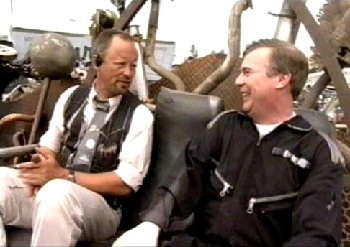 Robert and Martin Smith sharing the fun of radio controlled, big, powerful, dangerous machines
Robert and Martin Smith sharing the fun of radio controlled, big, powerful, dangerous machinesThe most successful team was The Cat-alysts from Jaguar Cars. (Jaguars are cats and Jags have catalytic converters). The producers saved what was possibly the most spectacular challenge: the "Car Jouster" battle to end series 4 in episode 12. In both series the teams had to mate complete working radio control systems with functioning cars. It was like Robot Wars but real life, full size. Apparently it was also partly inspired by the 1980's BBC TV series The Great Egg Race. The producers chose as their expert judge Martin Smith who had been a contestant on Robot Wars and later promoted to judge. A year later "Combat Cars" with Louise Brady and Jason Bradbury hit our screens. A clone or a spin off? Surely not!
Robert and Martin met again on the 8th of June 2014 when they were both judges on the "Turing Test" at the Royal Society in London. The Turing Test is designed to test if and when the power of Artificial Intelligence exceeds the power of human intelligence. It was claimed that, on that day, a computer had for the first time exceeded the intelligence of humans. Perhaps that computer was another big, powerful, dangerous machine. Hopefully they won't ever team up together Terminator style!
Key moments
Undoubtedly, a bloke who was nicknamed "Buzz" in the final episode of series 1. He made rockets in his spare time and was one of the oddest people they had on the show, albeit one of the most likeable. Madder than a Mad thing that shouts "Hello I'm Mad!" who is currently residing in McMadland Asylum in America. Possibly.
Inventor
Cathy Rogers and Eve Kay. They got the idea from that scene in the film Apollo 13 when Mission Control have to work out how the astronauts can fix a broken air filter given the bunch of junk they have around the ship.
Theme music
The literally banging theme and incidental music are by Simon Lacey. The theme has been subject to a few (quite subtle) tweaks over the years. In the 2005 series, it had different sound effects mixed in each week to fit the theme of that episode's challenge.
Trivia
There has never yet been an episode when both teams' machines failed to work - though they have come perilously close on quite a few occasions. Arguably the "caber tossing" machines in series 11 came closest - it was really only the secondary task of firing an Atlas Stone that prevented the contest from being a complete squib.
Future host Dick Strawbridge was a member of one of the house teams in the first series, and later of the 2000 series champions, Brothers In Arms. One series nine episode, Mechanical Mortars, was judged by him too.
One team had to pull out of a challenge in series 11 because the budget didn't cover the cost of transporting their machine to the test ground. It does seem a bit much to ask a team based in Cornwall to travel all the way to central Scotland - the location for this episode was Blair Castle in Perthshire, previously the setting for Conquer the Castle.
Challenge caught us off-guard when they bought the rights to repeat Robert's last three series from October 2022, which probably explains why they were removed from the All 4 catch-up service. They even got Robert Llewellyn in to voice the trailers. They lasted six weeks in the 3pm slot before being delayed by thirteen hours to 4am - although no-one bothered to tell whoever made the adverts, which continued to say 3pm to the end of the run.
Champions
Scrapheap (Challenge)
1998: The same teams, Orange and Yellow, competed every week. The six-show series was tied, 3-3.
1999: Megalomaniacs
2000: Brothers in Arms
2001: Cat-Alysts
2002: Barley Pickers
2003: The Destroyers
2004: Anoraks
2005: The Powerlifters
2007: Woof Justice
2008: Rusty Regiment
2009/10: The Wheel Nuts
From 2000 onwards, a champion-of-champions "grand final" has followed the series final in which that year's winners take on the reigning C-of-Cs. Winners are as above except for 2002 and 2003, when Cat-Alysts retained the title, and 2008, when Woof Justice kept hold of the title.
Scrappy Races (Rally)
2004: Chaos Crew
2005: Chaos Crew again
2006: Maximus
Merchandise
Video: Scrapheap Challenge: The Commandments (VHS) | (DVD)
Book: Behind The Scenes At Scrapheap Challenge by Robert Llewellyn
Web links
Off the Telly review (1999)
See also
Weaver's Week review (4 December 2004)

